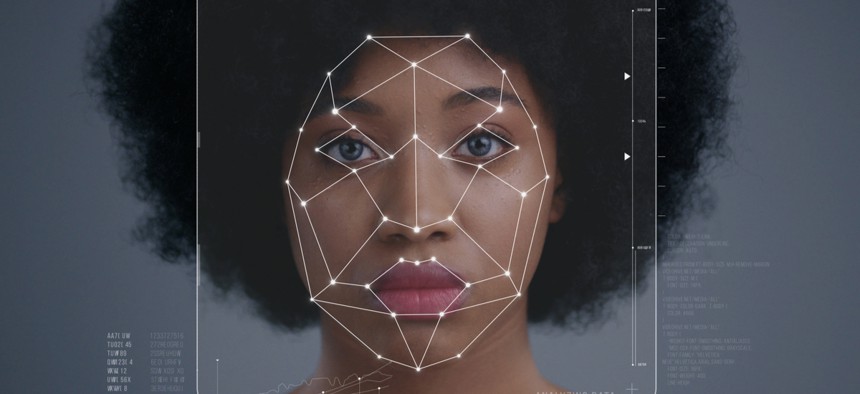Senators Call for a Moratorium on Government’s Use of Facial Recognition

Fractal Pictures/Shutterstock.com
Some say it’s a step in the right direction but limitations remain.
Two Democratic senators want to stop the federal government from using facial recognition technology until Congress passes legislation to properly regulate it—and they’ve produced their own legislation to do exactly that.
Sens. Cory Booker, D-N.J., and Jeff Merkley, D-Ore., introduced the Ethical Use of Facial Recognition Act Wednesday that aims to institute a moratorium on all of the federal government’s deployments and uses of the face-scanning technology, and would create a new congressional committee to study the matter and recommend comprehensive legislation for Congress to introduce.
“Facial recognition is a powerful and rapidly evolving technology, but without proper oversight, it poses a serious risk to privacy and safety,” Booker said in a statement.
According to the bill, the commission would “consider and create guidelines and limitations” to ensure that the technology is ethically deployed and does not impinge on individuals’ privacy rights or produce biased results. The new commission would be required to create a report for Congress within 18 months of the bill’s passage that would encompass its recommendations for the to-be-created policy. Congress would then have 90 days to prepare the legislation. However, this act is also equipped with exceptions that would enable law enforcement officials to use the technology with court warrants. And on top of the moratorium, the legislation also aims to prohibit state and local governments from using federal funds to purchase or invest in facial recognition software.
The bill comes only a couple months after a study from the National Institute of Standards and Technology found strong potential for bias in some leading facial recognition algorithms. The comprehensive report found that factors like age, race and gender can impact the accuracy in some of the most commonly used facial recognition algorithms deployed today. “Facial recognition technology has been demonstrated to be often inaccurate—misidentifying and disproportionately targeting women and people of color,” Booker noted in the announcement. “To protect consumer privacy and safety, Congress must work to set the rules of the road for responsible uses of this technology by the federal government.”
Evan Greer, deputy director of Fight for the Future, which launched its own campaign to ban facial recognition technology outright, told Nextgov that she and her team are still in the early stages of analyzing the senators’ bill but at first glance, “it seems to only place a short-term moratorium on facial recognition, and then attempts to fast track legislation on the topic.” Greer’s concerned that this “could lead to weak, industry-friendly regulations that serve to speed up the spread and adoption of facial recognition,” she said. The digital rights organization aims to work directly with lawmakers going forward to address those concerns.
“Decisions we make about the use of facial recognition will shape the future of human society,” Greer said. “Let's act like it.”
Senior Counsel and Director of the Domestic Surveillance Project at the Electronic Privacy and Information Center Jeramie Scott said the bill is “a step in the right direction” but it also has some limitations. EPIC has repeatedly called on Congress to suspend the Transportation Security Administration’s and Custom and Border Protection's use of facial recognition technology at airports, so Scott supports the bill’s potential halting of those airport deployments, he said. However, Scott told Nextgov the bill falls short in that it “does not address the commercial use of facial recognition” and “does nothing about all the data previously collected for biometric databases,” such as the FBI’s, State Department’s, and beyond.
“Ultimately, what is most important is the legislation the bill seeks to expedite to regulate facial recognition, and there is no guarantee the bill produces an outcome that is properly protective of privacy and civil liberties,” Scott said.






